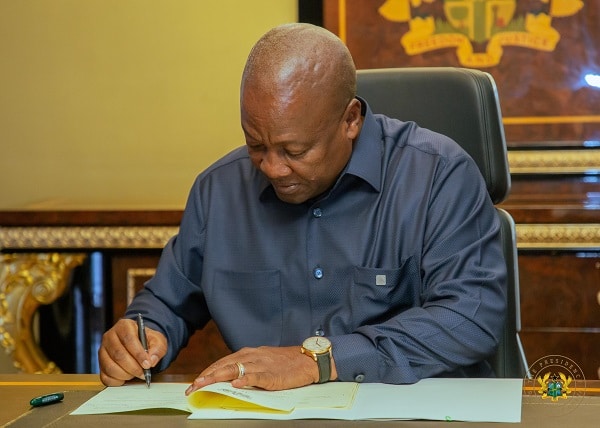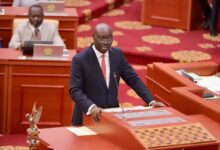President John Mahama Assenting to the bills.
President John Dramani Mahama of Ghana has recently assented to legislation abolishing the 10% betting tax, alongside the controversial Electronic Transaction Levy (E-Levy) and other taxes.
This decision, finalized on April 2, 2025, signals a shift in the government’s approach to taxation, particularly in light of the public outcry against burdensome tax regulations that disproportionately affect low-income citizens.
The betting tax, which was introduced two years ago was imposed as a means to generate revenue from a rapidly growing sector. It has long been a point of contention among both citizens and industry stakeholders. However, the economic environment, exacerbated by rising costs of living and limited disposable income for many Ghanaians, rendered this tax increasingly unpopular.
The repeal of this tax comes in response to calls from various advocacy groups, including those in the betting community, which argued that the tax stifled growth and viability in the industry.
Related Articles
Similar to the process that saw the E-Levy introduced under the previous government, the tax repeal was expedited through Parliament using a Certificate of Urgency. On March 26, 2025, members of Parliament overwhelmingly voted in favor of the repeal, highlighting a rare moment of consensus across party lines in response to public sentiment.
During discussions, Majority Leader Mahama Ayariga noted that repealing the E-Levy alone was expected to free up an estimated GH¢2 billion for Ghanaian families, providing much-needed disposable income in the current economic climate.
While the abolishment of the betting tax and E-Levy has garnered significant attention, it is important to consider the broader implications for Ghana’s fiscal policy. The E-Levy was introduced under the New Patriotic Party (NPP) government with the intention of expanding the tax base to include informal sectors, particularly through electronic transactions. Despite its good intentions, the E-Levy faced intense backlash, resulting in protests and low compliance rates.
The subsequent promise by both major political parties to repeal it during the 2024 campaign season reflects a growing recognition of the need to foster economic growth while alleviating the financial strain on citizens.

 Finance Minister Introduces Bills to Abolish Some Taxes, Including E-Levy and Betting Tax
Finance Minister Introduces Bills to Abolish Some Taxes, Including E-Levy and Betting Tax  Ghana Working Towards Scrapping of 10% Betting Tax on Players’ Winnings
Ghana Working Towards Scrapping of 10% Betting Tax on Players’ Winnings  NPP’s Bawumia Promises to Abolish 10% VAT on Betting to Ease Economic Burden
NPP’s Bawumia Promises to Abolish 10% VAT on Betting to Ease Economic Burden  Dr Bawumia: I will abolish betting tax, E-Levy, VAT on electricity, Emissions in Ghana
Dr Bawumia: I will abolish betting tax, E-Levy, VAT on electricity, Emissions in Ghana